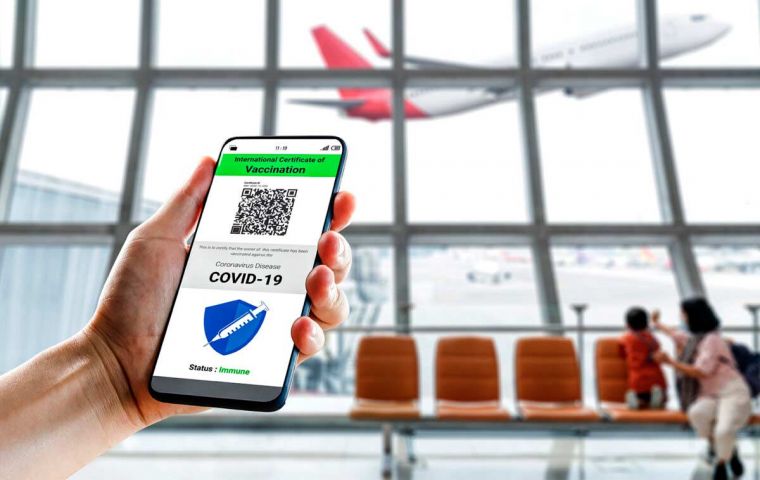MercoPress. South Atlantic News Agency
Tourists welcome again in US after 20 months
 The lifting of the travel ban does not mean entry into the United States will be fully open
The lifting of the travel ban does not mean entry into the United States will be fully open The Government of the United States Monday reopened the country's land and air borders Monday to foreign visitors who are vaccinated against COVID-19.
The decision ends 20 months of restrictions which have resulted in families separated and severe damages to the industry of tourism and air travel in addition to diplomatic rifts with many nations worldwide.
The ban, imposed by former President Donald Trump in March 2020 and upheld by his successor Joseph Biden has been widely criticized for its severity.
Passengers crammed European airports, while long lines of cars were seen before dawn at the borders with Mexico and Canada.
Restrictions did not apply to most Latin American countries, whose residents traveled en masse to the United States since the beginning of the year to get immunized as soon as the first vaccines began to be distributed, while now those unvaccinated might have a hard time getting in.
However, the doors were closed, and now open, to flows from much of the world, in an effort to slow the spread of the coronavirus. The list included the 26 European countries of the Schengen Area, as well as the United Kingdom, Ireland, Brazil, China, Iran, South Africa and India.
Entry by land or by ferry from Canada and Mexico was also prohibited.
To cope with the growing demand, airlines have increased the number of transatlantic flights and are planning to use larger aircraft.
Along the US-Mexico border, many cities struggled financially due to anticovid trade restrictions. In anticipation of the reopening, the currency exchange centers of Ciudad Juárez, in Mexico, were affected by the shortage of dollars. The government of Ciudad Juárez launched a special system to direct traffic, which includes the installation of portable toilets on the three bridges that cross into the United States “since waiting times of up to four hours are estimated,” said the local director of road safety, César Alberto Tapia.
Meanwhile, in the United States' northern neighbor, seniors will be able to resume their annual trips to Florida to escape bitter Canadian winters. Before the sun rose, cars and vehicles lined up on Rainbow Bridge, between Niagara Falls and New York. But the cost of PCR testing that Canada requires for cross-border travel - up to $ 250 - can be prohibitive.
The lifting of the travel ban does not mean entry into the United States will be fully open. Authorities plan to closely monitor the vaccination status of travelers and will continue to require that they submit negative COVID-19 test results.
The reopening will take place in two phases. Starting Monday, proof of vaccination will be required for “non-essential” trips, such as family visits or tourism. Unvaccinated travelers will be allowed to enter the country for “essential” trips.
Starting in early January, the US will require all visitors to be fully vaccinated to enter the United States by land, regardless of the reason for their travel.
US health authorities have said that all vaccines approved by the Food and Drug Administration (FDA) and the World Health Organization (WHO) will be accepted for entry by air.
For this reason, many travelers from Latin America and the Caribbean may now have difficulties entering, either because they have not had access to the vaccine or because they have not been vaccinated with immunizers approved by US authorities.
For example, vaccines such as Russia's Sputnik V and Chinese CanSino have yet to get a green light from the FDA or WHO, but they have been applied in many Latin American countries, including Argentina and Mexico.
In addition, this new requirement ends “vaccine tourism” in the United States.
Delta Air Lines has experienced a 450% increase in bookings of international flights compared to the six weeks prior to the White House's announcement. Several international flights are expected to operate at 100% capacity these days, it was reported.
The reopening will benefit the company's customers in 33 countries around the world, with Delta serving 10 of these with nonstop flights and more through partners such as KLM, Air France and Virgin Atlantic. The demand is reflected for both corporate and leisure travelers to popular destinations such as New York, Atlanta, Los Angeles, Boston and Orlando.




Top Comments
Disclaimer & comment rulesCommenting for this story is now closed.
If you have a Facebook account, become a fan and comment on our Facebook Page!